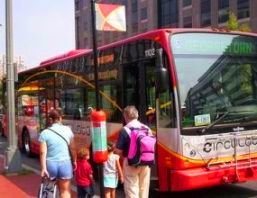Washington DC is an urban city with trendy neighborhoods such as Dupont Circle and Georgetown. If you are thinking of moving to DC, browse these pages to find out the pros and cons of each neighborhood, the average rent for an apartment, and the little details that make each neighborhood different and special.
Washington DC is divided into four quadrants: northeast (NE), southeast (SE), southwest (SW), and northwest (NW). The U.S. Capitol is at the center of the city. Although there is a variety of housing in DC, finding an apartment can often be a daunting task. Lack of familiarity with the city and the desire to find an affordable apartment in a safe area can make the process difficult. Remember that the search for housing can take a long time. So the earlier you start, the more options you will have!
 Adams Morgan
Adams Morgan
Who lives here: Young professionals, young families, students, diplomats, immigrants, longtime DC residents.
Location: 18th St NW and Columbia Rd NW.
Transit: Metro, Metrobus, DC Circulator. Although the Woodley Park/Zoo/Adams Morgan Station has the name of Adams Morgan, it is a 15-minute walk over the Duke Ellington Bridge to the heart of the neighborhood.
Rent for a studio apartment: $1600 and up.
Rent for a 1-bedroom apartment: $2000 and up.
Pros: Young neighborhood, popular nightlife, hot spot for shopping and dining.
Cons: Lack of parking, considered less safe than other neighborhoods, and distant from the nearest Metro station.
 Dupont Circle
Dupont Circle
Who lives here: Young professionals, young families, and longtime DC residents.
Location: 19th St NW and Connecticut Ave NW.
Transit: Metro, Metrobus, DC Circulator. Dupont Circle Station is located right in the heart of the neighborhood.
Rent for a studio apartment: $2000 and up
Rent for a 1-bedroom apartment: $2500 and up
Pros: Trendy neighborhood, GLBT friendly, with lots of great bookstores, bars and restaurants.
Cons: Expensive, lack of parking.
Chinatown
Who lives here: college educated professionals. A blend of races and ages.
Location: 18th St NW and Columbia Rd NW.
Transit: Metro, Metrobus, DC Circulator. Gallery Place-Chinatown Station connects the neighborhood to the rest of DC.
Rent for a studio apartment: $1600 and up.
Rent for a 1-bedroom apartment: $1800 and up.
Pros: The neighborhood has new apartment buildings, a vibrant nightlife, restaurants and bars.
Cons: Lack of parking, traffic during rush hour, homeless people, noisy.

Georgetown
Who lives here: Highly educated professionals, GW students, politicians, lobbyists, and social elite.
Location: M St NW and Wisconsin Ave NW.
Transit: Metrobus and DC Circulator. No Metro.
Rent for a studio apartment: $2000 and up
Rent for a 1-bedroom apartment: $2500 and up
Pros: Upscale neighborhood, surrounded by retail and nightlife.
Cons: Very expensive, no parking, no metro; rentals tend to go to government officials and diplomats rather than students.

Foggy Bottom
Who lives here: Diplomats, World Bank employees, longtime Washington DC residents, and GW students.
Location: Along the Washington DC/Virginia border.
Transit: Metro, Metrobus. Foggy Bottom-GWU Station connects the neighborhood to the rest of DC.
Rent for a studio apartment: $1500 and up.
Rent for a 1-bedroom apartment: $200 and up
Pros: Close to GWU and the Kennedy Center. Safe and conveniently located.
Cons: Expensive, no parking, few apartments in the lower rent rate.

Capitol Hill
Who lives here: Young professionals, families, politicos, longtime DC residents.
Location: Center of the city.
Transit: Metro, Metrobus. Capitol South Station connects the neighborhood to the rest of DC.
Rent for a 2-bedroom row house: starts at $2500
Rent for a 3- and 4-bedroom house: starts at $3000
One bedroom and studio apartments are available, but prices vary greatly.
Pros: Old historical neighborhood with culinary and cultural attractions, such as the U.S. Capitol, the Library of Congress, and the Supreme Court.
Cons: Lack of parking.
Neighborhoods Near DC
Old Town Alexandria
Who lives here: Federal and military personnel, families with children.
Distance to DC: 20 minutes
Transit: Metro, DASH, Fairfax Connector.
Rent for a studio apartment: $1600 and up
Rent for a 1-bedroom apartment: $1800 and up
Pros: Restored historic houses with shops, restaurants, and bars.
Cons: Traffic, lack of street parking, flooding risk.
Silver Spring, Maryland
Who lives here: Families, young professionals
Distance to DC: 30-35 min.
Transit: Metro, bus.
Rent for a studio apartment: $1000 - $1200
Rent for a 1-bedroom apartment: $1300 and up
Pros: the beltway, large shopping districts, urban feel.
Arlington, Virginia
Who lives here: Families, young professionals, students
Distance to DC: 5-15 min.
Transit: Metro, bus, highway, back roads.
Rent for a studio apartment: $1200
Rent for a 1-bedroom apartment: $1400
Pros: Urban villages, such as Ballston, Clarendon, Court House, Crystal City, Rosslyn, and Virginia Square, are built around Metro stations making it easy to live, work, shop, and play within a walkable, pedestrian-friendly environment. Young crowd with local retail and nightlife.
Cons: Expensive, lack of street parking.


